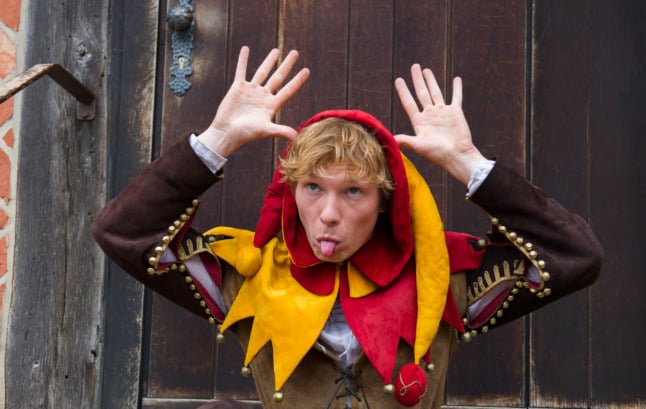German word of the day: Der Schabernack

If you like to take part in practical jokes then this is the German word for you.
The noun’s main meaning relates to a ‘prank’, ‘practical joke’ or, more colloquially, ‘shenanigans’. Schabernack can be traced back only as far as the Middle High German schabirnack and the Middle Low German schavernak.
Practical jokes are probably most commonly associated with children or April Fools Day, and as with other Western countries, Germany does also take part in this custom on April 1st - though a prank played on this day would be referred to specifically as an Aprilscherz (Scherz being another noun for ‘joke’).
READ ALSO: German word of the day: Der Aprilscherz
A Schabernack is also a term used regionally to describe a child as a ‘little monkey’, similar to the term of endearment ‘cheeky monkey’ in English. This relates to the phrase Schabernack treiben which means ‘to behave mischievously’.
There are various other ways to describe a practical joke too, including the particularly bizarre noun die Eulenspiegelei, which does literally translate to ‘owl-fried egg’! This particular word, though, originates from a famous German chapbook protagonist, Till Eulenspiegel, who plays numerous pranks on those around him - including exposing his behind to the townspeople as a child, and performing a rather antisocial (and smelly) act on an Innkeeper's table.

What a joker! The actor Jacob Matschenz poses as Till Eulenspiegel. Photo: picture alliance / dpa | Philipp Schulze
A word of warning though, perhaps don’t rely on Till Eulenspiegel’s pranks as inspiration for your own Schabernacke! (Especially not the one at the Inn - we don't think the owner of your local Kneipe will be particularly amused if you do.)
Examples:
Er spielt mit mir Schabernack.
He’s playing a trick on me.
Du bist ein Schabernack!
You’re a little monkey!
Comments
See Also
The noun’s main meaning relates to a ‘prank’, ‘practical joke’ or, more colloquially, ‘shenanigans’. Schabernack can be traced back only as far as the Middle High German schabirnack and the Middle Low German schavernak.
Practical jokes are probably most commonly associated with children or April Fools Day, and as with other Western countries, Germany does also take part in this custom on April 1st - though a prank played on this day would be referred to specifically as an Aprilscherz (Scherz being another noun for ‘joke’).
READ ALSO: German word of the day: Der Aprilscherz
A Schabernack is also a term used regionally to describe a child as a ‘little monkey’, similar to the term of endearment ‘cheeky monkey’ in English. This relates to the phrase Schabernack treiben which means ‘to behave mischievously’.
There are various other ways to describe a practical joke too, including the particularly bizarre noun die Eulenspiegelei, which does literally translate to ‘owl-fried egg’! This particular word, though, originates from a famous German chapbook protagonist, Till Eulenspiegel, who plays numerous pranks on those around him - including exposing his behind to the townspeople as a child, and performing a rather antisocial (and smelly) act on an Innkeeper's table.

What a joker! The actor Jacob Matschenz poses as Till Eulenspiegel. Photo: picture alliance / dpa | Philipp Schulze
A word of warning though, perhaps don’t rely on Till Eulenspiegel’s pranks as inspiration for your own Schabernacke! (Especially not the one at the Inn - we don't think the owner of your local Kneipe will be particularly amused if you do.)
Examples:
Er spielt mit mir Schabernack.
He’s playing a trick on me.
Du bist ein Schabernack!
You’re a little monkey!
Join the conversation in our comments section below. Share your own views and experience and if you have a question or suggestion for our journalists then email us at [email protected].
Please keep comments civil, constructive and on topic – and make sure to read our terms of use before getting involved.
Please log in here to leave a comment.